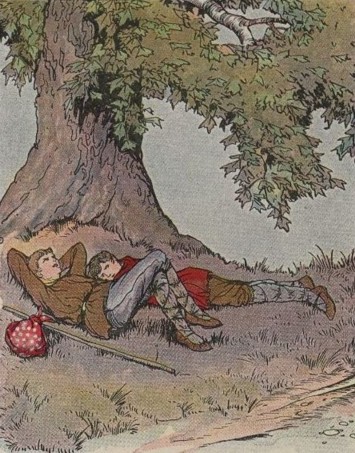PART A_1
Let’s learn vocabulary. Listen and repeat the words and the sentences with your tutor.
PART A_2
| 1. seek | /seek/ |
| -to go in search or quest of: | |
| He has been seeking a high-paying job for six months. | |
| 2. widespread | /WAHYD-SPRED/ |
| -spread over or open, or occupying a wide space. | |
| Widespread flooding in the suburbs has been reported. | |
| 3. bear | /bair/ |
| -to produce by or as if by natural growth | |
| This mango tree bears tons of mangoes in summer. | |
| 4. litter | /LIT-er/ |
| -to strew (a place) with scattered objects, rubbish, etc.: | |
| A student was sent to the principal’s office for littering the hallway. | |
| 5. appreciate | /uh-PREE-shee-eyt/ |
| -to value or regard highly; place a high estimate on: | |
| I appreciate those who believe in me. |
PART B_1
Let’s read the story. Please read them aloud, and I will check your pronunciation and intonation.
PART B_2
THE PLANE TREE

Two Travelers, walking in the noonday sun, sought the shade of a widespreading tree to rest. As they lay looking up among the pleasant leaves, they saw that it was a Plane Tree.
“How useless is the Plane!” said one of them. “It bears no fruit whatever, and only serves to litter the ground with leaves.”
“Ungrateful creatures!” said a voice from the Plane Tree. “You lie here in my cooling shade, and yet you say I am useless! Thus ungratefully, O Jupiter, do men receive their blessings!”
Our best blessings are often the least appreciated.
PART C_1
Let’s answer comprehension questions. Please answer them based on the story.
PART C_2
| 1. | How did the two travelers describe the Plane tree? |
| 2. | Does the tree bear any fruits? |
| 3. | How did the Plane tree react to the traveler’s ungrateful remarks? |
PART D_1
Let’s discuss the story. Please answer the questions below and express your opinions.
PART D_2
| 1. | How would you describe the characteristics of the travelers? |
| 2. | Do you think their comments about the tree were acceptable? Why or why not? |
| 3. | If you were the tree, how would you teach the travelers to be grateful? |
| 4. | The fable’s lesson is “Our best blessings are often the least appreciated.” Do you agree with this? Why or why not? |
| 5. | What are you grateful for today? |
REVIEW AND FEEDBACK
Now, let us review the things that you learned in this lesson.
ではこのレッスンで学んだことを振り返りましょう。
(Please give a short feedback on how your student did on your class.)
| Grammar 文法 |
Pronunciation 発音 | Vocabulary 単語 |
Comprehension 理解 |
|
|---|---|---|---|---|
 GOOD GOOD |
文法の誤りはほとんどなく、完全な文章で話すことができる | ほとんどの単語をはっきりと正しく発音することができる | 習った表現を適切に使うことができる | 文章を理解し、質問に正しく答えることができる |
 FAIR |
文法の誤りはあるが、完全な文章で話すことができる | 発音の練習が必要な言葉がいくつかある | たまにミスはあるが、習った表現を適切に使うことができる | 文章を完全に理解するのは難しく、質問に正しく答えられないときもある |
 POOR |
文章で話すのは難しく、単語だけで話すことができる | 発音の練習が必要である | 習った単語と表現を少しだけ使うことができる | 文章を理解するのは難しく、質問に答えるのは難しい |
Parts of this lesson material are based on:
An eBook from The Project Gutenberg.
This eBook is for the use of anyone anywhere at no cost and with almost no restrictions whatsoever. You may copy it, give it away or re-use it under the terms of the Project Gutenberg License included with this eBook or online at www.gutenberg.org
An eBook from The Project Gutenberg.
This eBook is for the use of anyone anywhere at no cost and with almost no restrictions whatsoever. You may copy it, give it away or re-use it under the terms of the Project Gutenberg License included with this eBook or online at www.gutenberg.org